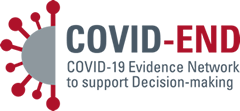Question generation
One of the core aims of COVID-END is to help reduce duplication and better coordinate the evidence syntheses, HTAs and CPGs being produced (i.e., to support the evidence supply side). Therefore, developers are provided with guidance to make the best decisions as to whether the question(s) they wish to address are already answered in a manner that suits their needs and contexts.
This first step is to formulate an answerable question using the PICO or extended PICO format for HTAs and CPGs. See these general resources for developing a PICO and related questions from COVID-END. Well-developed PICO questions are central to developing new guidelines as they help limit the scope, clearly specify the search strategy, guide data extraction and help with formulating or identifying recommendations. Outcomes should be important for decision-making and determine the perspective of the guideline panel. But importantly, outcomes should be important for the people who are affected by the decision, and not only for the researchers (i.e., they should be patient-important outcomes and not clinical indices that have no meaning for patients). Outcomes can be ranked by the guideline panel from critical to not important, should be relevant to the target population and informed by priority setting. Setting questions and outcomes, and rating their importance is done via consensus development by the guideline group.
The second step is to search appropriate databases (such as those described below) for guidelines or HTAs in a database and/or a guideline/HTA clearinghouse. Unlike searching for primary evidence, search strings need not be complex (especially in guideline clearinghouse databases). Start with the most basic elements (such as the Population or Intervention) and expand or add additional elements. When searching for guidelines/HTAs in traditional databases, consider using a guideline search filter and the EUnetHTA Guideline Information Retrieval Guideline (formerly available at https://eunethta.eu/wp-content/uploads/2018/01/Guideline_Information_Retrieval_V1-1_0.pdf) as reference. Also search (e.g. via the GIN Library and Registry) for guidelines being planned or currently in development to determine whether there are opportunities for collaboration and consider registering planned guidelines in the GIN Library (free and open to all for registering guidelines).
Below we summarise some resources that provide access to guidelines, from health care related databases, guideline-specific databases and key guideline developers:
|
Guideline databases and resources Listing of the names is not an endorsement of quality by COVID-END |
|
| ECRI Guidelines | Repository of objective, evidence-based clinical practice guideline content. |
| Guideline Central | Guideline library for multiple formats. Requires registration. |
| Australian Clinical Practice Guidelines (formerly available at https://www.clinicalguidelines.gov.au) | Clinical practice guidelines developed for use in Australian health care settings. |
| GIN library | Global repository of guidelines and guidelines in development. The GIN website additionally Includes a COVID-19 collection of resources. Formerly available at https://g-i-n.net/covid-19 |
| Trip Database | Database for systematic reviews, primary studies and guidelines. Useful PICO search and filter function. |
| BIGG (PAHO) | Pan American Health Organisation International database of guidelines developed with the GRADE methodology. |
| HTA clearinghouses | |
| INAHTA | The international HTA database provides free access to bibliographic information about ongoing and published health technology assessments commissioned or undertaken by HTA organisations from around the world. See also the INAHTA HTA database: https://www.inahta.org/hta-database/ |
| BRISA (PAHO) | Pan American Health Organisation regional database of health technology assessment reports of the Americas. |
| EUnetHTA | European network for health technology assessment database, including COVID-19 response publications. See also the EUnetHTA ongoing projects (POP) database; methodological guidance; “companion guide” for preparing HTA. |
